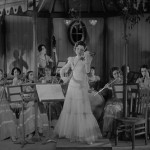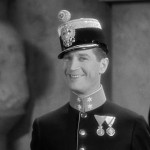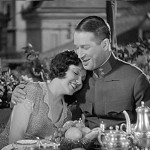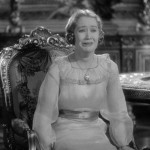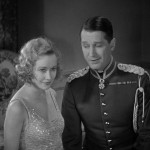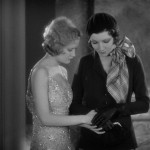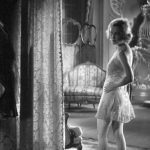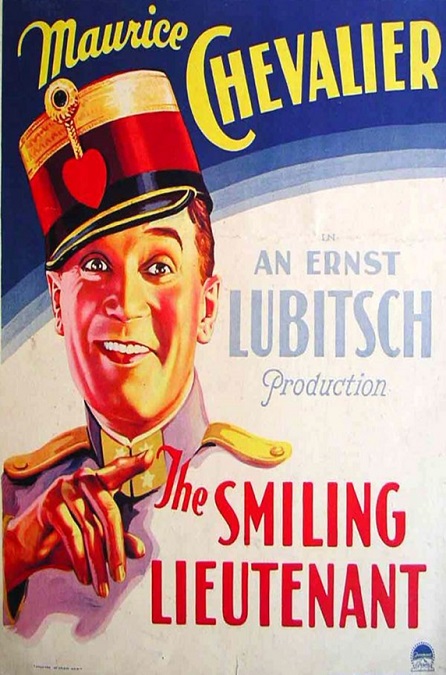
The Smiling Lieutenant – 1931 / 1932
This was a strange film. Here we are with Maurice Chevalier again. Apparently he was a very popular guy back then. I think he was either a good friend of, or was under contract along with director Ernst Lubitsch. I seem to always see their names together. Again, Chevalier plays a man in the military, in a position associated with the monarch of some European country. Again, he marries into the royal family and is miserable. Hmmm… this is starting to sound very familiar. This film had these and other similarities to the film The Love Parade.
The plot was simple enough to follow. I’ve never seen a Chevalier film without a remarkably simple plot. So, here we go. This shouldn’t take long. Chevalier plays Lieutenant Nicholas “Niki” Von Preyn. He falls in love with Franzi, played by Claudette Colbert, the conductor of an all-female orchestra. But Niki is in the Emperor’s guard. While standing at attention for the arrival of a foreign King and his daughter Princess Anna, played by Miriam Hopkins, he smiles and winks at Franzi. But the wink is intercepted by the princes, who throws a crying fit because a commoner dared to smile at her. He is forced to marry the Princess to satisfy her honor, despite his love for Franzi. They go back to live in the fictional country of Flausenthurm.
Franzi follows them just to get a glimpse of her man as he is wed to the Princess. When a miserable and depressed Niki discovers that Franzi is near, he begins his affair with her all over again. Anna finds out and has Franzi arrested. The two women fight over Niki, and in the end, Franzi finds that she likes the other girl. She gives Princess Ana tips on how to be the kind of girl Niki likes, and leaves the country. Niki comes home to find the homely Anna transformed into a sexy, jazzy, cigarette smoking, silk-clad girl. He instantly falls in love with her and the marriage is suddenly a happy one. Franzi who??? The end.
But that was the problem, I think. The plot was too simple and reinforced several ideals and stereotypes that are outdated for a modern audience. For example, the notion that it is not only acceptable for a man to cheat on his wife with a younger woman, but even expected. Then there is the concept that it is better to save face and live a miserable life than to admit a mistake and live a happy one. Of course, we also have the stereotype that all royalty, or one might say all rich people, are stuffy, old-fashioned, and spoiled.
But all that being said, I have to be honest. When the end of the movie arrived, I felt myself caring for Franzi’s character when she sacrificed her pride, her future, and her man to resolve the plot’s conflict. I thought Colbert turned in a great performance. The frivolous script didn’t give her much to work with, but she pulled it off well, giving it a deeper emotional content than it deserved.
And there was a scene near the end when I found myself laughing out loud. When Princess Anna has Franzi arrested and brought to the palace, she tells Franzi that she hated her and wanted to kill her. Franzi says the same back to the Princess. Anna slaps Franzi across the cheek. Franzi slaps Anna back. Then in unison, the two women fall onto the bed, sobbing their hearts out. Anna wipes her eyes and asks Franzi, “Did I hurt you?” “No,” Franzi replies. “Did I hurt you?” “YES!! WAAAAAHH!!!” This whole scene had me cracking up. Here we just had an early example of an on-screen cat-fight. This was easily on par with Joan Collins and Donna Mills. Eat your heart out, Linda Evans!
The movie was not a bad film, just one that I had seen before. I mentioned the movie The Love Parade. You see one of them, and you have seen them both.
And just as an afterthought, I have to mention a few things at which I had to role my eyes. First, they showed Claudette Colbert playing the violin. She very obviously had no skill in playing the instrument. Miriam Hopkins, on the other hand appeared to be quite adept at playing the piano. Second, someone needs to tell the script writer that it is acceptable to say “bravo” when applauding a male performer. When the performer is female, the proper term is “brava.” And finally like most other musicals from that era… wait! This was a musical? Yeah. The songs were just that memorable.
